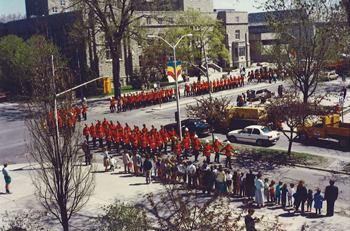Celebrating centenaries has always held a profound significance in human culture. The observance of a sesquicentennial, or 150th anniversary, presents a unique opportunity to reflect on historical milestones, evolution, and the interplay between time and faith. In Christian contexts, such anniversaries can serve as powerful reminders of God’s enduring promises and the continuity of spiritual legacies. This exploration delves into the meaning of a sesquicentennial, its implications, and how such a landmark can shape and inform Christian thought and community.
The term “sesquicentennial” originates from Latin roots, where “sesqui-” denotes one and a half (1.5) and “centennial” refers to a hundred years. Hence, it signifies a period of 150 years. This literary construction invites believers to ponder not merely the passage of time but the deeper significance embedded within these years. Such milestones can provide an avenue for contemplating God’s faithfulness and the steadfastness of His covenant throughout generations.
Anniversaries like the sesquicentennial often compel communities to assess their historical journey—much like Israel was encouraged to remember its own narrative. In the Hebrew Scriptures, God implores His people to remember their past, whether through Passover or festivals that commemorate liberation and covenant. Similarly, celebrating a sesquicentennial allows a Christian congregation to recount the journey of faith, charting their progress, challenges, and triumphs over the years. The narrative woven through collective memory can reinforce community bonds and deepen spiritual understanding.
As communities prepare to engage in sesquicentennial celebrations, various events can be planned to enrich the experience. One might consider a series of educational forums that delve into the historical context of the formation of the church or institution being honored. Inviting historians or theologians to speak can provide attendees with insights into the significant events spanning the past 150 years, emphasizing pivotal moments of divine intervention and grace.
Additionally, worship services can be a central component of the sesquicentennial observance. Utilizing hymns and songs that have stood the test of time can evoke nostalgia and stimulate collective worship. These celebrations may also include a special liturgy dedicated to honoring the legacy of those who played instrumental roles in shaping the community’s faith journey. Such acts reinforce connection and can foster a greater appreciation of God’s handiwork in the church’s history.
Another enriching endeavor could involve community service projects, embodying the spirit of Christ’s love in tangible ways. Engaging in acts of charity mirrors the call to serve others while honoring the foundational teachings of Jesus. This could include organizing food drives, community meals, or partnerships with local organizations that seek to uplift the marginalized. Through this, the church not only marks its sesquicentennial but also reaffirms its commitment to living out the Gospel in practical applications.
For personal enrichment, believers may engage in reflection through the lens of Scripture. Many passages highlight the importance of remembering God’s faithfulness. Consider Psalm 78:4-7, which instructs the faithful to tell the stories of God’s deeds to their children so that they may also place their trust in Him. This sentiment encapsulates the essence of celebrating a sesquicentennial. It is an opportunity to nurture the faith of future generations by imparting the narratives that shaped their heritage.
Furthermore, the sesquicentennial can act as a catalyst for renewal. Re-examining the founders’ vision can inspire contemporary believers to re-align their mission with the original ethos that propelled this community 150 years ago. This reflection on the foundations of faith may lead to revitalization, as congregations seek to stay relevant in a constantly changing cultural landscape, all while remaining anchored in timeless truths.
As individuals reflect on the monumental 150 years, the significance extends beyond mere historical data. It becomes a connection point to communal identity: a tapestry woven with stories of perseverance, revival, repentance, and grace. Each believer has a role to play in this enduring saga, reinforcing the notion that the journey of faith is both communal and individual, necessitating introspection and celebration.
In conclusion, a sesquicentennial is a profound opportunity to engage with heritage and faith. From remembrance to renewal, the observance of this milestone can foster deeper connections among members, anchoring them in their shared history while propelling them towards a future enriched by faith. Christian communities contemplating their sesquicentennial should immerse themselves in remembrance, celebration, and action—recognizing that every year lived under God’s providence is not merely a passage of time, but a testament to the grandeur of His purpose.
Ultimately, as communities celebrate their sesquicentennial, they should remember that time is a divine gift. Each year offers the chance for transformation, growth, and deeper engagement with the mysteries of faith, illustrating the ever-persistent truth that God’s faithfulness does indeed endure through all generations.



